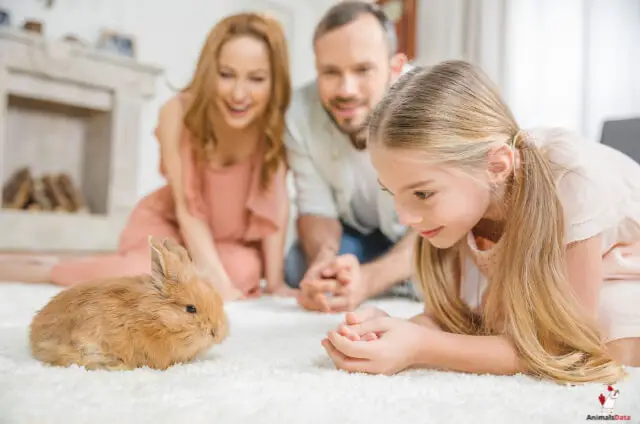Although rabbits are not as affectionate or as expressive as dogs and cats, they are familiar with their owners and won’t have any problem recognizing them. Like the other pets, rabbits spend a reasonable amount of time connecting with their owners. If a rabbit owner dedicates their time and energy to caring for the bunny, the little one won’t have any problems bonding and recognizing them.
If you’ve observed rabbits (whether caged or not), you may have noted that they are innately curious. When you stick out your thumb, they will come closer and even try to nibble you. If you start rubbing your rabbit’s back, it will get closer to you to experience more.
This article will look at the intricate details of how rabbits recognize their owners. It will also give you some answers to some emotional rabbit-owner questions. Let’s get cushy!
Rabbits And Recognizing Their Owners
Before a rabbit familiarizes itself with its owners, it takes a great deal of time. A rabbit will only give particular interest to someone who fulfills its needs and takes care of them. So, if you spend less time with your pet, you could merely be a stranger before its eyes.
For a rabbit to even recognize who you are (owner or not), it first needs to feel secure around you. Unlike dogs and cats, rabbits do not jump into the action. Since they are prey animals, they will behave reservedly even when interacting with humans, however harmless.
So, for your rabbit to recognize you, you need to appear lovely. Do not walk in on the rabbit playing weird, shrilling noises that may scare the bunny. Approach the rabbit with calmness and if you need to touch it, do it with gentleness and a lot of caution.
Since smell is an essential sense for many non-human animals, you can stick out your palm for the rabbit to sniff. When the bunny picks out your smell, it will start forming an association. Be advised not to use any strong scents as they may sting the rabbit’s olfactory senses.
If you keep making the rabbit feel warm and comfortable around you, you will see results. In a considerable amount of time, the rabbit will even hop in your direction. If you want it to come to you, you can stick out some treats while whispering sweet nothings.
Is There Such A Thing As Rabbit Loving Their Owners?
Yes, there is. For most social beings, emotions are always involved. While a rabbit may not be mindful of the idea of love, it will indeed have an extraordinary inclination towards you. And what is love, really? Isn’t it a matter of expression? When your rabbit feels like it trusts you, it will express itself warmly around you and crave your attention. In human terms, that is one of the definitions of love.
However, you need to recognize that, as humans, rabbits are different. Each has its own unique and peculiar quirks. Other rabbits will be expressive in terms of showing love, and others, well, will act aloof.
Regardless of the rabbit breed, you need to give enough attention. Handling and feeding are two of the best ways to do that, so you need to be an excellent pet parent.
The strokes and snuggles on your rabbit give them the impression of love and care. If another human has ever petted you, you will understand that some soothing touches create strong bonds.
And what about feeding? Food is essential to the survival of any species, including rabbits. So, your rabbit will recognize you if you’re the person that’s constantly feeding them. The bunnies start associating you with survival, and when they see you, they start salivating. Therefore, there is a need for you to provide the best rabbit diet.
Let’s talk about overt, observable signs. There are some physical expressions that happy rabbits engage in. If your bunny does any of these things, it could be telling you – even without the words – that it loves you:
| No. | Rabbit Loving Action | No. | Rabbit Loving Action |
| 1 | Sniffing | 5 | Licking |
| 2 | Gentle nibbling | 6 | Nesting into you |
| 3 | Slight head-butting to make you stroke it | 7 | Going in circles around you |
| 4 | Flicking it heels when running | 8 | Remaining relaxed |
For you, relaxing may not seem like the most affectionate thing under the sun. But when you think about it, we are always relaxed, calm, and chilled when we’re around those we love.
Another that is not included in the table is staring – yes, staring! That bunny may be looking at you with its big, jelly eyes in a way to say, “I have loved you since you bought me from PetSmart.”
Does My Rabbit Remember Me?
Research has it that rabbits understand the environment’s objects using smell, sound, and shape. Your voice (smooth, gentle) and your natural body odor are items that the rabbit will use to identify you.
Many mammals (including the rabbit) have what is known as associative memory. If your rabbit were in the wild, it would have memories of all its predators. With that information, it works hard to stay out of trouble.
The same memory is used to identify caregivers. When you interact with the rabbit for long periods, it will associate you with safety and protection. This implies that you should spend a considerable amount of time loving, cuddling, and caring for the bunny.
To answer the section – yes. The associative memory will kick in when you appear near the rabbit’s cage. It will see that you’re the person that cuddles and feeds it. But your rabbit won’t remember your name – those are not important in the rabbit hole.
Does My Rabbit Know Its Name?
Dogs and cats can pick out the names their owners give them, but how about rabbits? Well, rabbits will not react with zeal and energy when you call them, but repeating it can make a difference. When you are cuddling or feeding the bunny, you can mention its name multiple times. This way, it will associate those sounds (that form its name) to the finer things in life. Whenever you say the name, the rabbit will pay more attention because it knows that good things are coming.
But you shouldn’t expect too much. The only person who cares about the rabbit’s name is you since the rabbit’s memory isn’t that complex. However, do not stop yourself from going all out regarding the bunny’s name – shorten, change, and abbreviate it to match how your bunny is.
If you want your rabbit to recognize its name, use it often.
Questions Related To The Subject
1. Do Rabbits Show Their Humans Any Affection?
Yes, yes – they do. Rabbits will develop and express love through grooming and socialization. If you want to know that your rabbit is affectionate, it will lick and nibble, and seemingly, it will ask that you groom it. It will nudge you lightly and jump and down until you give it some attention.
2. When A Rabbit Pees On Something, Is It A Sign Of Affection?
Pee is more of a territory marker than a sign of affection. When your rabbit goes around spraying items with its urine, the only explanation is dominance. However, someone can argue that rabbits will mark what they love. If yours marks you with its pee, you may be your bunny’s sweetheart.
3. Is It Okay For Me To Sleep With My Rabbit?
It is possible, but you should be cautious about it. I’m talking about the rabbit peeing all over you. The little one should be trained well so that the rabbit doesn’t do its business under your sheets.
Since rabbits like hopping around, you should ensure that all windows and doors are closed.
Also, you need to be careful not to squash them. If you do, the rabbit may suffocate without your knowledge, and indeed, that is not something you want.
If you ask me, you should avoid sleeping with the rabbit – let it rest in its cage.
Final Words
Rabbits are brilliant, and they can recognize their owners. To know if your rabbit knows who you are, it will display some signs as captured in the table.
To build a connection and a long-lasting relationship with the bunny, you need to spend more time with it. Whenever you’re together, you should talk gently and handle it smoothly. This should be given on top of the quality food and care.
Once you develop a connection with the rabbit, you will feel love, affection, and respect reign. For rabbits to be the best pets, they need a lot of attention. If left alone, they are likely to develop separation anxiety and depression.

I’m Christopher Benjamin, a dedicated Animal Nutritionist at Ethos Veterinary Health with a Bachelor of Science in Animal Science from Michigan State University. My lifelong passion for animals led me to establish AnimalsData.Com. Here, I share expert advice, educational resources, and inspiring stories to empower fellow pet lovers worldwide. Join our community as we celebrate the beauty and diversity of our beloved animal companions!
